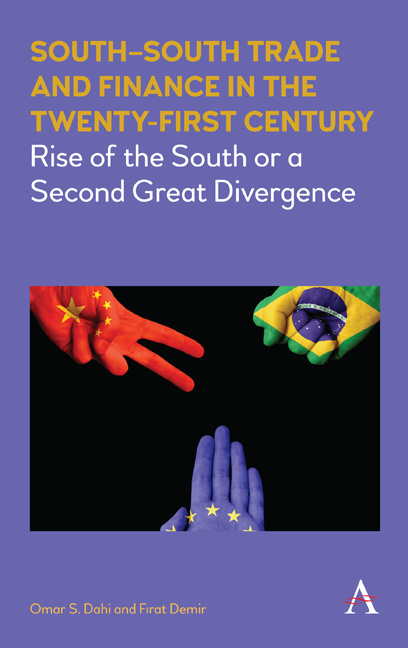 South-South Trade and Finance in the Twenty-First Century
South-South Trade and Finance in the Twenty-First Century Book contents
- Frontmatter
- Dedication
- Contents
- List of Figures
- List of Tables
- Preface
- Acknowledgments
- Chapter One Introduction to South–South Relations
- Chapter Two South–South Relations in Their Historical Context
- Chapter Three Theoretical Frameworks and Emerging Trends
- Chapter Four Empirical Analysis of the Structure of Trade and Finance
- Chapter Five Stopping a Second Great Divergence: A New Framework for South–South Relations
- Chapter Six Concluding Thoughts
- Appendix
- References
- Index
- Frontmatter
- Dedication
- Contents
- List of Figures
- List of Tables
- Preface
- Acknowledgments
- Chapter One Introduction to South–South Relations
- Chapter Two South–South Relations in Their Historical Context
- Chapter Three Theoretical Frameworks and Emerging Trends
- Chapter Four Empirical Analysis of the Structure of Trade and Finance
- Chapter Five Stopping a Second Great Divergence: A New Framework for South–South Relations
- Chapter Six Concluding Thoughts
- Appendix
- References
- Index
Summary
Tolstoy wrote in Anna Karenina : “All happy families are alike; each unhappy family is unhappy in its own way.” This is a book about the unhappy families. The countries of the global South, also called developing, un(der)developed, semi-developed, periphery, the Rest, Third World and so forth, are more than ever at the center of attention in the world economy and are shaping the new world order for the twenty-first century. China, India, South Korea and Brazil have become pivotal players in the new era of global production and trade and are increasingly assertive of their newly gained powers in world politics. Other countries of the South seek similar economic gains and more active roles. The rise of the Southern countries has also led to renewed calls for strengthening cooperation among them. In fact South–South cooperation has even become a buzzword to represent anything and everything the North–South economic and political exchanges are (and were) not.
We have written this book to explore both the possibilities and the limits of South–South cooperation in the twenty-first century. In doing so, we have two goals. First, we want to provide an overview of the historical and theoretical context of South–South cooperation. Second, we want to look beyond the “knight in shining armor” versus “dark lord of the east, Sauron” narratives of the rise of the South that we find too often in academic and popular writing. By reexamining the evidence from South– South and South–North economic exchanges, we hope to strip the debate of the excessive pessimism or optimism that biases most analyses of the subject.
Our main premise is that the new multipolarity in the world economy is found within the global South as well as between the North and the South. The rising Southern powerhouses of the world economy, such as BRICS (Brazil, Russia, India, China and South Africa), have had diverse effects on the rest of the developing world, and in this way they appear to replicate the North–South dilemmas and ominous contradictions for the countries we refer to as the Rest of South. Changing the course of this pattern of South–South exchanges requires an honest discussion of the effects of the Emerging South on those countries that continue to struggle for a decent life and, in some cases, simply for survival.
- Type
- Chapter
- Information
- South-South Trade and Finance in the Twenty-First CenturyRise of the South or a Second Great Divergence, pp. xv - xviPublisher: Anthem PressPrint publication year: 2016


